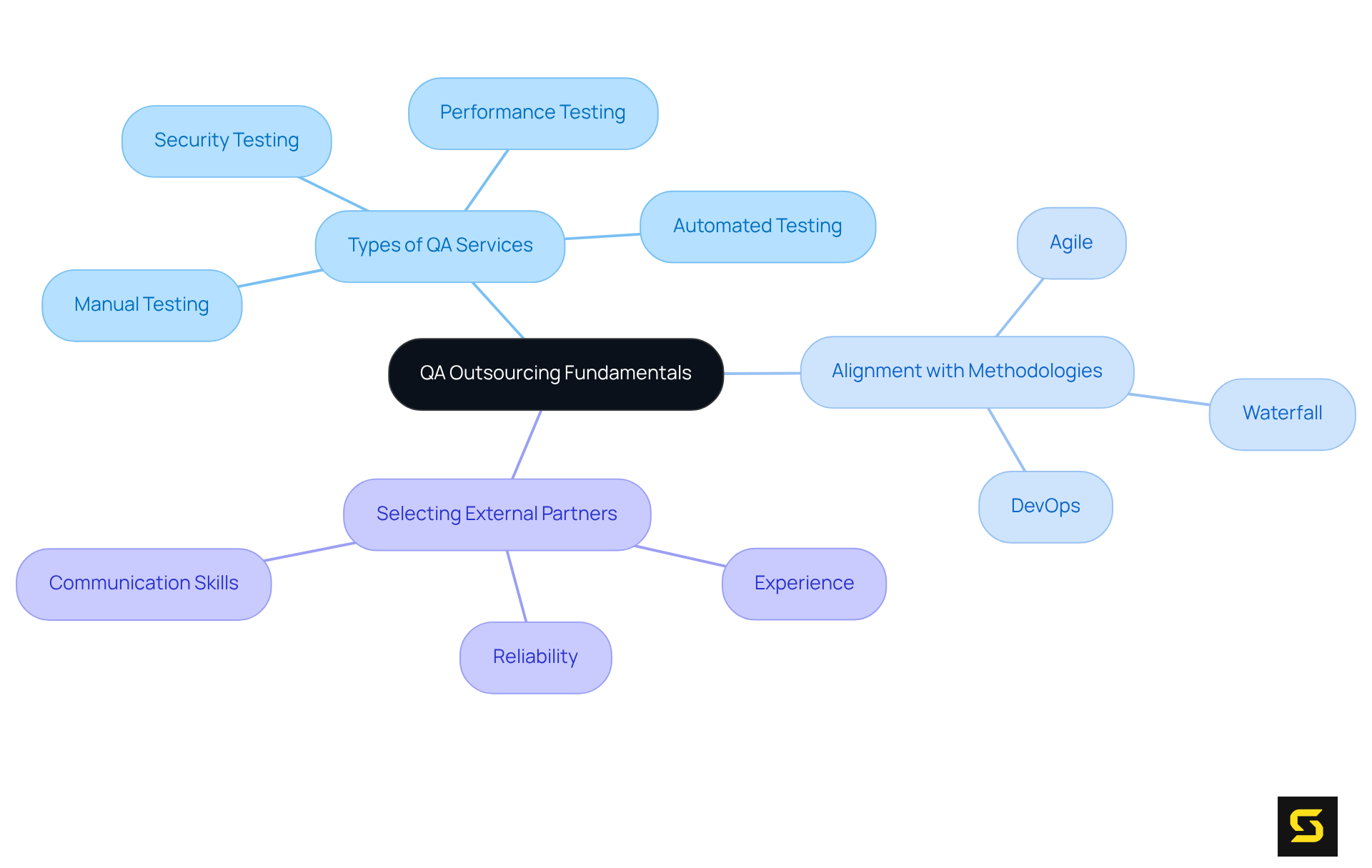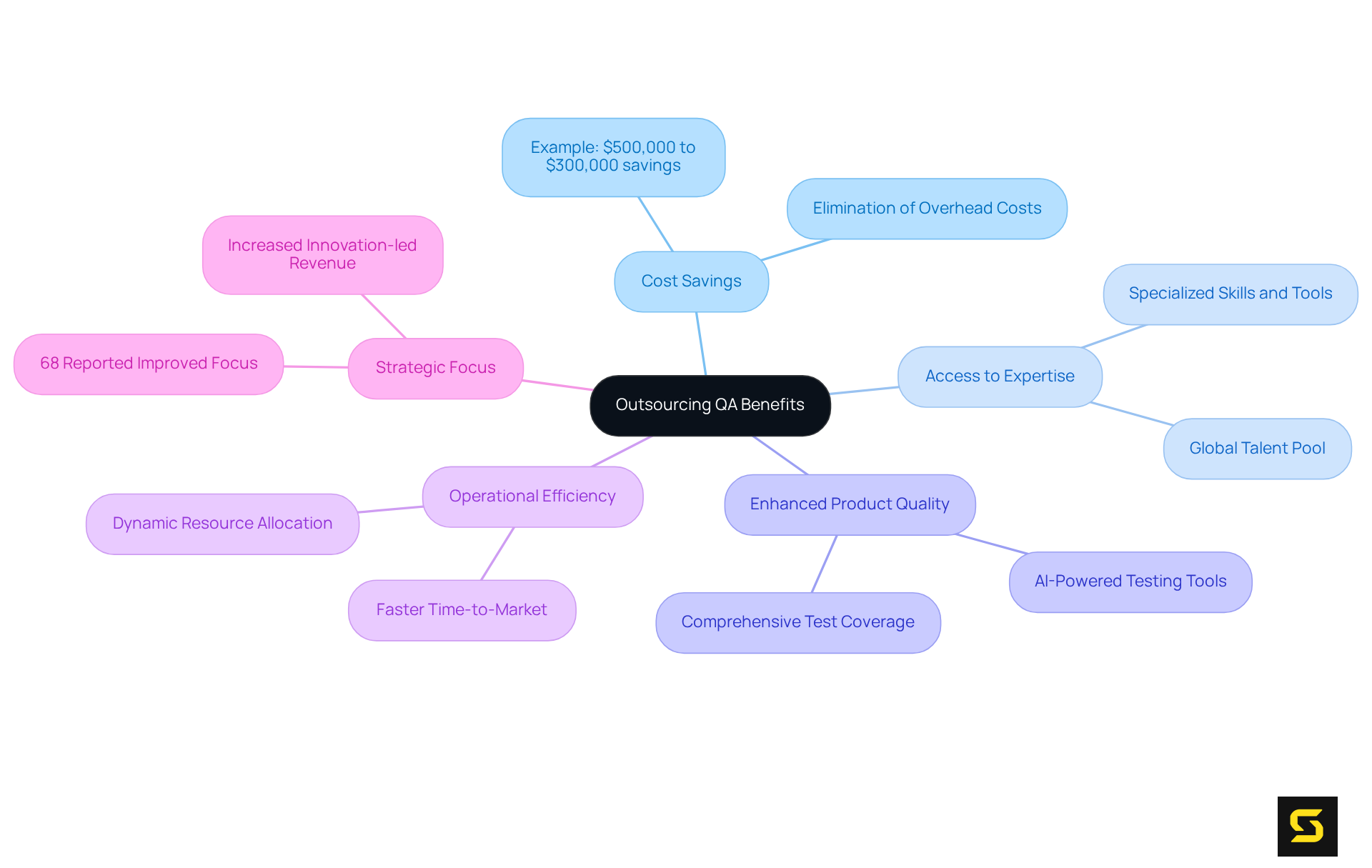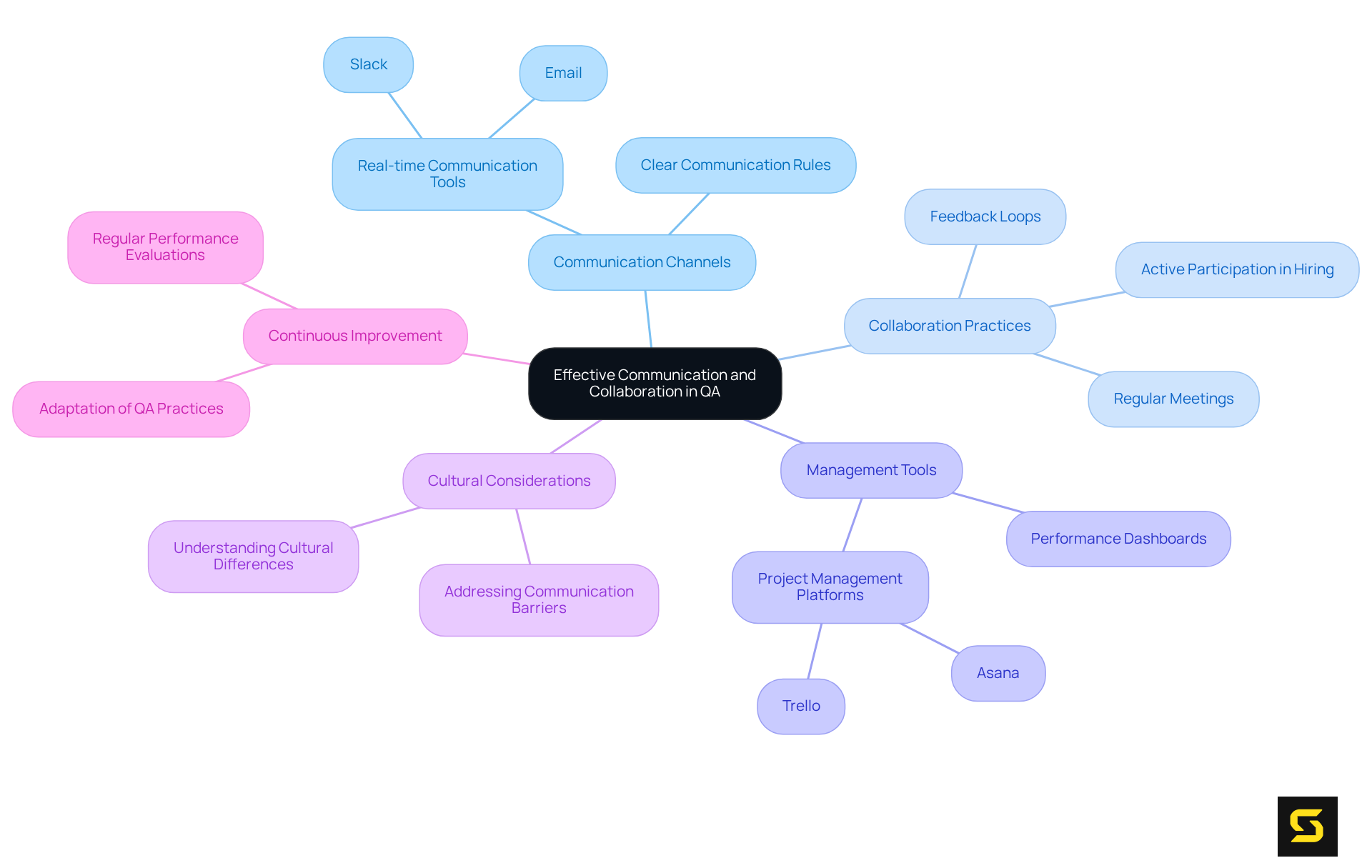Overview
This article delineates four essential practices for effectively outsourcing quality assurance (QA):
- Understanding QA fundamentals
- Identifying key benefits
- Selecting the right partner
- Establishing effective communication
These practices are not merely suggestions; they are backed by compelling evidence that demonstrates how organizations can realize significant cost savings, enhance product quality, and improve operational efficiency through strategic outsourcing of their QA processes. By implementing these practices, businesses position themselves for success in a competitive landscape.
Introduction
Outsourcing quality assurance (QA) has emerged as a pivotal strategy for organizations aiming to enhance efficiency and product quality while reducing costs. By leveraging specialized external expertise, businesses can streamline operations and focus on core initiatives. However, the journey to effective QA outsourcing is fraught with challenges, from selecting the right partner to ensuring seamless communication. What essential practices can organizations adopt to navigate these complexities and maximize the benefits of outsourcing QA?
To effectively harness the potential of QA outsourcing, organizations must first acknowledge the importance of choosing the right partner. This decision is not merely a transactional one; it is a strategic alliance that can significantly impact product quality and operational efficiency. Engaging with a partner that possesses a proven track record in the industry can provide invaluable insights and resources, ultimately leading to superior outcomes.
Moreover, fostering seamless communication is crucial in overcoming the inherent challenges of outsourcing. Establishing clear channels of communication ensures that expectations are aligned and that feedback is timely and constructive. This proactive approach not only mitigates misunderstandings but also cultivates a collaborative environment conducive to innovation and improvement.
In conclusion, organizations looking to maximize the benefits of QA outsourcing must adopt essential practices that prioritize partner selection and communication. By doing so, they can navigate the complexities of the outsourcing landscape and achieve their goals with confidence.
Understand the Fundamentals of QA Outsourcing
The strategic approach to outsource quality assurance involves delegating the evaluation and validation of software products to external teams or firms. This practice empowers organizations to leverage specialized expertise, reduce operational costs, and concentrate on core business functions.
Understanding the various types of QA services available is fundamental. These include:
- Manual testing
- Automated testing
- Performance testing
- Security testing
It is crucial for organizations to align their QA processes with their development methodologies, whether Agile, Waterfall, or DevOps. A recent analysis reveals that over 70% of digital transformation projects now choose to outsource quality assurance components, underscoring the growing acknowledgment of its significance.
Selecting the right external partner is essential. Businesses should evaluate potential suppliers based on their experience, reliability, and communication skills. For instance, a mid-sized bank achieved a remarkable 12× increase in QA throughput and a 90% reduction in processing time by utilizing efficient external services. However, organizations must remain vigilant against common pitfalls in quality assurance delegation, such as data breaches and inconsistent delivery.
By establishing a comprehensive understanding of these fundamentals, businesses can effectively assess their needs and expectations when they decide to outsource quality assurance.

Identify Key Benefits of Outsourcing QA for ROI and Efficiency
The decision to outsource quality assurance presents substantial advantages, including significant cost savings, access to specialized expertise, and enhanced product quality. Organizations can eliminate overhead costs associated with hiring and training in-house teams when they outsource quality assurance to external QA providers. For example, a mid-sized company reported a reduction in QA expenses from $500,000 to $300,000 annually, freeing up resources for innovation and growth. This finding aligns with the case study titled 'Cost Savings and Operational Efficiency,' which emphasizes that companies can outsource quality assurance to significantly lower QA costs while upholding high standards.
External QA partners bring extensive experience in various assessment methodologies, thereby enhancing software quality. Moreover, delegating tasks allows companies to dynamically adjust their QA efforts according to project needs, ensuring optimal resource allocation. This flexibility accelerates time-to-market and boosts customer satisfaction, ultimately leading to a higher return on investment. According to PwC’s 2024 survey, 68% of companies that decided to outsource quality assurance reported improved focus on strategic initiatives, resulting in a 10-20% increase in innovation-led revenue.
Furthermore, the integration of AI-powered testing tools, such as QMentisAI, which can cut testing timelines by up to 60%, illustrates how automation enhances efficiency and effectiveness in QA processes. As companies navigate the complexities of software development, they find that to outsource quality assurance is a strategic choice to enhance efficiency and maintain a competitive advantage. However, it is crucial for organizations to evaluate the safety measures of potential external service providers to mitigate risks associated with data privacy and security.

Select the Right QA Outsourcing Partner
Selecting the right partner to outsource quality assurance is not just important; it is essential for elevating software quality to new heights. Organizations must prioritize several key factors in their decision-making process.
-
First and foremost, assess the provider's technical proficiency and their experience with specific technologies and methodologies that are relevant to your project. Look for documented case studies or client testimonials that highlight their success in similar endeavors; these serve as indicators of reliability and capability.
-
Effective communication practices and cultural compatibility with your organization are equally crucial, as they foster collaboration and ensure that QA outcomes align seamlessly with your expectations.
-
Moreover, evaluating the scalability of their services is vital; a versatile partner can adapt to changing requirements and fluctuating workloads, ensuring that you remain agile in a dynamic market.
-
Compliance with industry standards and data protection protocols cannot be overlooked, as these are essential in preventing financial and reputational damage from potential security breaches.
-
A structured QA process not only supports reliable testing outcomes but also promotes continuous improvement, which is critical in today’s fast-paced environment.
By thoughtfully evaluating these factors, companies can significantly enhance the quality of their software products and may choose to outsource quality assurance to achieve superior overall results. Take decisive action now to secure a QA partner that aligns with your vision and standards.

Establish Effective Communication and Collaboration Practices
To ensure successful QA delegation, organizations must establish clear communication channels and collaboration practices. Regular meetings, status updates, and feedback loops are essential for keeping all stakeholders informed and aligned. Employ management tools to enhance clarity and monitor progress. Additionally, encourage a culture of open communication where team members feel comfortable sharing insights and concerns. This collaborative approach not only enhances the quality of the QA process but also allows us to outsource quality assurance, fostering a sense of partnership between internal teams and external providers, ultimately leading to better software outcomes.
Before delegating tasks, it is crucial to assess existing QA processes to set realistic expectations and align the external team with the company's needs. Incorporating data-driven QA processes allows for smarter decision-making and optimization of analytics for better insights. Furthermore, continuous improvement should be a focus, with regular performance evaluations and feedback sessions to adapt QA practices as necessary.
While tools like Slack for real-time communication and Asana for project management are beneficial, organizations should also be aware of potential communication barriers and cultural differences that can arise when they choose to outsource quality assurance. Addressing these challenges is essential to ensure effective collaboration.

Conclusion
Outsourcing quality assurance represents a strategic decision that can significantly enhance software quality while enabling organizations to concentrate on their core competencies. By leveraging specialized expertise, businesses can not only reduce operational costs but also elevate their product offerings through effective collaboration with external partners.
This article underscores several essential practices for successfully outsourcing QA. First, it is imperative to understand the fundamentals of QA services. Recognizing key benefits such as cost savings and efficiency is crucial. Additionally, selecting the right outsourcing partner based on technical proficiency and communication skills is vital. Finally, establishing robust communication and collaboration practices ensures that the outsourcing process aligns with organizational goals and leads to superior quality outcomes.
Ultimately, embracing these practices can transform how organizations approach quality assurance. Companies are urged to take decisive action by evaluating their current QA processes, seeking out reliable partners, and fostering a collaborative environment that prioritizes open communication. By doing so, businesses can not only mitigate risks but also unlock the full potential of their software development efforts, positioning themselves for sustained growth and competitive advantage in the marketplace.
Frequently Asked Questions
What is QA outsourcing?
QA outsourcing involves delegating the evaluation and validation of software products to external teams or firms, allowing organizations to utilize specialized expertise, reduce operational costs, and focus on core business functions.
What types of QA services are available?
The available types of QA services include manual testing, automated testing, performance testing, and security testing.
Why is it important to align QA processes with development methodologies?
Aligning QA processes with development methodologies, such as Agile, Waterfall, or DevOps, is crucial for ensuring that quality assurance is effectively integrated into the software development lifecycle.
What trend is observed in digital transformation projects regarding QA outsourcing?
Over 70% of digital transformation projects now choose to outsource quality assurance components, highlighting the increasing recognition of its importance.
How should organizations select an external QA partner?
Organizations should evaluate potential suppliers based on their experience, reliability, and communication skills to ensure they choose the right external partner for QA services.
Can you provide an example of the benefits of QA outsourcing?
A mid-sized bank experienced a 12× increase in QA throughput and a 90% reduction in processing time by utilizing efficient external QA services.
What are some common pitfalls to avoid in QA outsourcing?
Organizations must be vigilant against common pitfalls such as data breaches and inconsistent delivery when outsourcing quality assurance.
How can businesses effectively assess their needs when outsourcing QA?
By establishing a comprehensive understanding of QA fundamentals, businesses can better assess their needs and expectations when deciding to outsource quality assurance.





